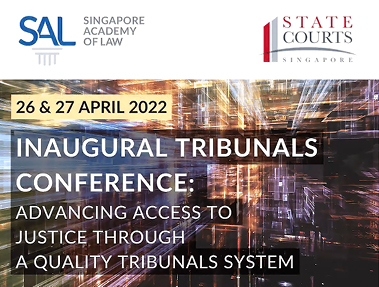As the world transited to a “new normal” where COVID-19 is endemic, 2022 offered us an opportunity to reflect upon the seismic changes in the preceding years, and renew our commitment to press ahead with innovation, even as we pursue our core values and mission.
Snapshot of work done in 2022
We have seen efficiency gains as we continue to hone our court processes. We achieved an overall clearance rate of 113% in 2022, a slight increase from 110% in 2021.
Over the year, our judicial officers collectively issued about 2,000 written decisions. Of these, 25 were selected for reporting in a new series of law reports by the Singapore Academy of Law. This is a key initiative which serves to recognise the valuable contributions by the lower courts to Singapore’s jurisprudence.
Pushing frontiers in the conduct of hearings
The mode for conducting hearings continues to be a significant focal point for innovation. Whilst the public health situation no longer necessitates social distancing, remote hearings by video conferencing remain the default for a wide range of matters. This has facilitated expedient disposal of straightforward matters, saving time and resources for parties and the courts alike. A return to the physical hearings of the past would be inconceivable for many types of hearings.
Another front where technology has enabled a re-imagining of court processes is asynchronous hearings. By conducting proceedings on an e-platform, without the need to schedule a time for parties and the court to convene, significant efficiencies are reaped. We have since widened its application in civil interlocutory matters and are taking the next major step of expanding asynchronous hearings to criminal pre-trial hearings.
Deepening our judicial skillset
Training and mentorship continue to play a central role in deepening judicial skillsets.
In 2022, our officers clocked an average of 105 training hours, an 8.2% increase over 2021. Training content was carefully curated and included bespoke courses, structured in collaboration with the Singapore Judicial College. Speakers from diverse disciplines were invited to share their expertise with our officers, making for a multi-faceted training diet.
Twelve new judicial officers embarked on their mentorship journey with senior colleagues, who each committed to spending 20 to 30 hours with their mentees. Whilst heavy, we believe this commitment in time and effort will yield solid returns in the form of better judges and, ultimately, quality justice.
Demonstrating our thought leadership
2022 was a productive year in terms of State Courts’ contributions to thought leadership in key areas of law. In collaboration with the Singapore Academy of Law, the State Courts organised two conferences featuring distinguished local and international speakers:
- The inaugural Tribunals Conference was held on 26 and 27 April 2022, with the theme of ‘Advancing Access to Justice Through a Quality Tribunals System’. It involved the sharing and discussion of experiences, learning points and initiatives on the law and practice of tribunals.
- The Sentencing Conference held on 31 October and 1 November 2022 was themed ‘Sentencing Frameworks: Instructive, Communicative, Consistent Outcomes’. It touched on topics such as the use of sentencing frameworks, the sentencing of youthful offenders and mentally disordered offenders, as well as the use of technology to assist in the task of sentencing.
Both conferences were well attended and received by local and foreign participants.
The State Courts continued to be active on the international stage. As a founder and EXCO member of the International Consortium for Court Excellence, the State Courts organised a two-day virtual conference on pursuing court excellence in challenging times. The State Courts also chaired the inaugural meeting of the International Judicial Dispute Resolution Network.
Moving onwards and upwards
A number of initiatives focused on enhancing access to justice and empowering self-represented litigants at the State Courts are in the pipeline. One such initiative that we expect to roll out within the year is a Digitised Defects List that can be utilised by litigants in renovation or tenancy disputes at the Small Claims Tribunals to list the areas in dispute in a manner that facilitates a systematic and efficient adjudication of the claim. These efforts dovetail with the broader Judiciary-wide focus on access to justice.
The past three years have taught us that the one true constant is change. The State Courts remain steadfast in our commitment to evolve and ensure that we remain fully equipped to deliver quality and timely justice in an increasingly complex legal landscape.

Vincent Hoong
Presiding JudgeState Courts






